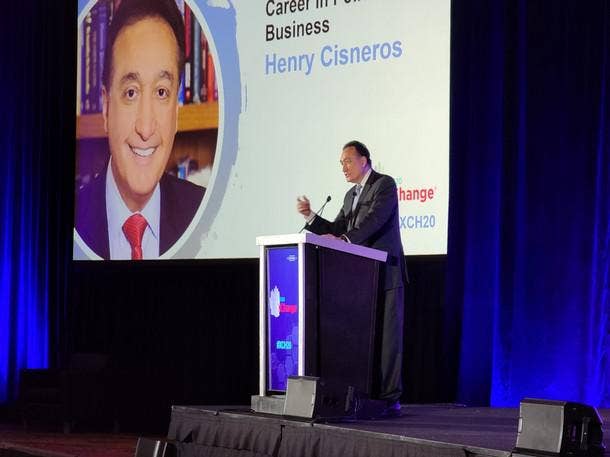Henry Cisneros: Urbanization, Changing Demographics Should Be A Focus For Solution Providers
The former HUD secretary and former San Antonio mayor says the expansion of major metro areas and growth of the Latino population in the U.S. have broad implications for the tech sector.

In a world where change is the "one thing we can count on," solution providers must adapt to more than just the changes that are explicitly tech-driven.
Major trends in society in the U.S. such as urbanization and shifting demographics also have huge implications for the solution provider community.
[Related: Former U.S. Army Captain Shannon Huffman Polson: 'A Leader Has To Own Her Story']
That was the message Tuesday from Henry Cisneros, whose career in politics and business has included serving as the Secretary of Housing and Urban Development under President Bill Clinton. He spoke to an audience of solution providers at XChange 2020, which is taking place this week in San Antonio and is hosted by CRN parent The Channel Company.
Earlier in his career, Cisneros spent eight years as mayor of San Antonio--which made him the first Hispanic-American mayor of a major U.S. city--and he is currently chairman and co-chief investment officer of American Triple I Partners, a developer and manager of infrastructure assets based in New York.
At XChange, Cisneros said he's gained a vantage point on the tech world through a number of means, including the thriving innovation economy in San Antonio--where the biomedical industry is the No. 1 employer and cybersecurity is another key sector.
The opportunities for solution providers from the current societal mega-trends are vast, but also require new ways of thinking in some cases, Cisneros said.
Urbanization, for instance, is not just about the increasing concentration of people in cities--but also about the creation of "megalopolis" collections of cities such as on the East Coast, West Coast, the Heartland and the "Texas Triangle" between Dallas, Houston and San Antonio/Austin.
"This whole urbanization of the country has great market potential for you," Cisneros said. "It is real. It's not reversible. It's going to continue, and therefore you have to relate to it."
Another major shift in American society that is only going to continue is the expansion of the Latino population, which is the fastest-growing subset of the population, Cisneros noted.
"It is the largest minority today, and growing very dramatically. Today [it's] about 55 million people, but by 2040, [it will be] 100 million," he said. "As time progresses, this demographic becomes more important."
Allen Falcon, CEO of Westborough, Mass.-based Cumulus Global, said that the trends highlighted by Cisneros are critically important for solution providers. On urbanization, solution providers can help businesses to be more effective in denser, more-urbanized contexts, he said.
Additionally, the fact that metro areas may encompass multiple city centers "changes the dynamic of how we're going to work and how we're going to live," Falcon said. "And so there will definitely be opportunities there."
In terms of shifting demographics, solution providers ought to be aware that "there are probably markets and opportunities that we're not seeing yet, because we tend to stay within the bubbles in which we operate," he said. "And so I think part of the message was, look beyond the bubble you're in for the other opportunities--the other cultural centers and communities that are evolving who need our services. As a small business, one of his messages was, if you're not reaching out to the Latino-Hispanic business community, you're missing a huge economic force that's on the rise."
Falcon said the address prompted him to ask himself a key question--"how do I connect with that part of the community where there's opportunities for me, and engage with that part of the business community?"
Ultimately, Cisneros said that society needs business leaders who embrace transformation.
"It says to people, we're in this together. It is a cause we are embarking in to build a company, to develop a new product, to pioneer new services and new methods," he said. "We're a team. And that's the kind of leadership that I think our society needs more of. And frankly, the most successful people that I have met as leaders are those who understand that difference."